Jennifer Hallock's Blog: Sugar Sun Series Extras, page 11
February 8, 2018
Different Strokes for Buddhist Folks
In Japan, Buddhist and Shinto sacred spaces are so interwoven throughout the city, that you can be forgiven for confusing the two. While the two initially conflicted, they have since found a way to “co-exist and even complement each other,” according to Japan-Guide. The Shinto shrines were all new to me, which is why I posted on them first. They provide the people with both hope and comfort, thanks to their ever-present world of spirits.
Buddhism is more familiar to me. I began studying the teachings of the Buddha while an exchange student in Thailand, continued to meditate at Wat Thai in Washington, D.C., and have since taught 9th graders about the origins and practices of Buddhism for almost twenty years.
 Koyasu Pagoda at the Kiyomizudera Temple (780 CE). A visit here is said to guarantee an easy and safe childbirth—but don’t get any ideas about me having kids because that’s not why I went. However, I am picking up my puppy this weekend, so maybe that counts?
Koyasu Pagoda at the Kiyomizudera Temple (780 CE). A visit here is said to guarantee an easy and safe childbirth—but don’t get any ideas about me having kids because that’s not why I went. However, I am picking up my puppy this weekend, so maybe that counts?One of our favorite temples was one that most guidebooks overlooked. This was especially surprising since it sits only blocks from the Kyoto train station: Higashi Honganji Temple. We kept passing it in the bus, though, and I finally broke down and said, “It’s too big to ignore. Let’s go in.”
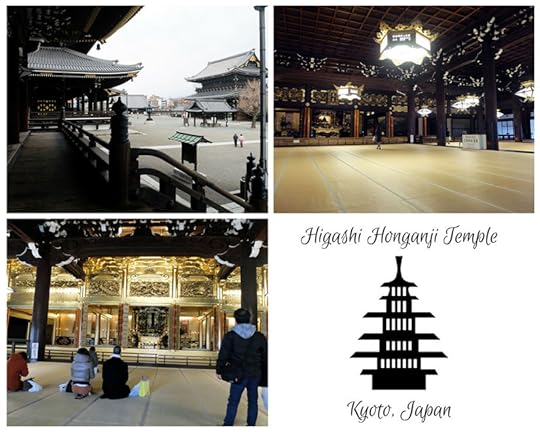 The Higashi Honganji Temple, a five-minute walk from the Kyoto train station. Temple icon from Vexels.com.
The Higashi Honganji Temple, a five-minute walk from the Kyoto train station. Temple icon from Vexels.com.The temple was magnificent. It was made of grand beams that had been hauled down the mountains by the faithful. Inside, entire rooms were gilded in gold leaf, and the rows tatami mats were the biggest I’ve ever seen.
Higashi Honganji is part of the Pure Land Buddhism sect, the one my students find the most perplexing. After we learn all about how the Buddha instructs us to break our fetters to the material world, here comes Pure Land that offers a beautiful, sensuous nirvana with trees made out of diamonds and pearls. How do you get there? By chanting the name of the heavenly Amitabha Buddha enough times, paying to have sutras copied, or other mystical rituals. The BBC says of Pure Land: “Pure Land Buddhism offers a way to enlightenment for people who can’t handle the subtleties of meditation, endure long rituals, or just live especially good lives.”
The other extreme is Zen Buddhism, which eschews the otherworldly and tells you to look inside yourself for the answers. Any activity can provide you with the opportunity for meditation, and even a simple lesson or riddle (called a koan) might spontaneously propel you to enlightenment. For example, Chinese Zen master Linji Yixuan said: “If you meet the Buddha on the road, kill him.” Wait, really? Well, no, not really, because murder is against the Five Precepts, but you must kill your attachment to the Buddha, and, in fact, not see him as the Buddha but as a mortal man like the rest of us. Any and all attachment causes dissatisfaction and disappointment in life (dukkha).
 The Ginkakuji, or Silver Pavillion, Zen Buddhism Temple in Kyoto, Japan.
The Ginkakuji, or Silver Pavillion, Zen Buddhism Temple in Kyoto, Japan.Zen gardens serve this purpose. You spend all your time building a cone of sand, like at the Ginkakuji temple above, but the real point is to destroy it once it’s finished. This is the only way to prove your detachment. Yeah, it’s really hard.
My biggest attachment while traveling is to my camera. My husband had to regularly remind me not to see Japan from behind a lens. (I use a Fuji X20, in case you were wondering. It’s awesome.) Many temples ask you not to take photos inside, which I understand because flash can cause damage over time to antiquities, and people taking selfies are annoying. However, I was not using flash, nor taking a selfie, and my camera can be totally silent, so…
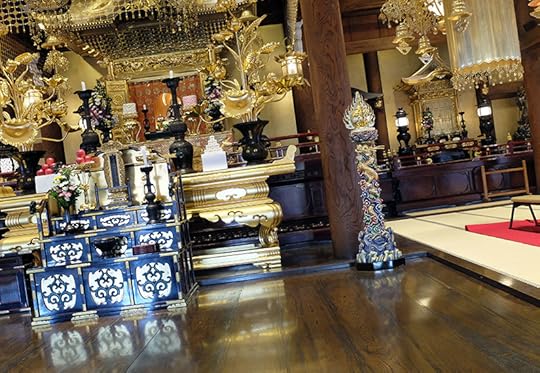 A stealth photo inside the Eikando Temple. I was shooting from the hip—literally—so please excuse the angle.
A stealth photo inside the Eikando Temple. I was shooting from the hip—literally—so please excuse the angle.I broke the rules. Sorry. The Buddha would be very disappointed in me. But there was just so much to photograph. I will finish this post with the gorgeous Kinkakuji Temple, northwest of Kyoto center. Go in peace, my friend.

February 4, 2018
Shinto in Kyoto: Good Wishes and Safe Travels
Shinto, the indigenous religion of Japan since the 8th century, teaches us about spirits, or kami, who inhabit inanimate objects and the landscape in general.

One way that we can communicate with these spirits is through inscribed wooden wishing plaques, or ema, that adherents leave at shrines. There were hundreds of miniature wooden gates (below) that mimicked the thousands of life-sized vermillion portals at Fushimi Inari (top), a huge shrine which reaches all the way up the side of a mountain southeast of Kyoto.

Since the white fox is the messenger animal of the spirit Inari, he has his own special wooden wishing plaques, too.

Making wishes sounds like fun, doesn’t it? But Shinto has a maudlin side, too. For example, jizo rocks represent the god who helps deceased children into the next world. Jizo gods can be found everywhere, each donated by a family who had lost a son or daughter. (And, yes, the bibs keep the god warm!) This particular collection was found in the middle of a strip mall in the Sanjo Dori area near our hotel.

If I remember correctly, there was a Starbucks across the walkway from this shrine—and by the end of our week there, that kind of contrast no longer surprised me at all. Stay tuned for more on Kyoto’s mix of tradition and modernity.
January 29, 2018
Japan’s Warm Welcome: Suzuki-San

Our warmest welcome—and our biggest find—was the Kyoto Suzuki Furudouguten. Welcome to Mr. Hallock’s childhood in 1970s Japan.
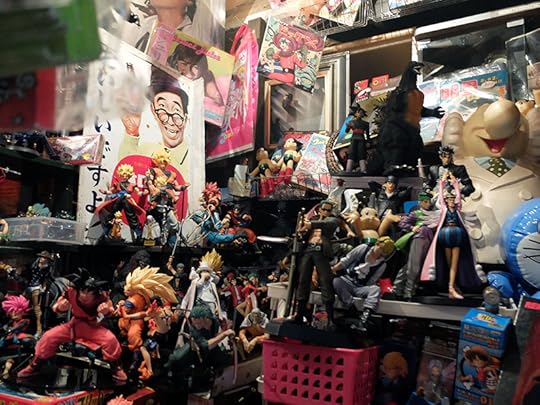
Mr. H grew up in toy stores—not the mall kind, nor the department store kind, but the small neighborhood kind with action figures and trading cards and stuff. The whole time we were in Kyoto, he complained that they didn’t exist anymore.
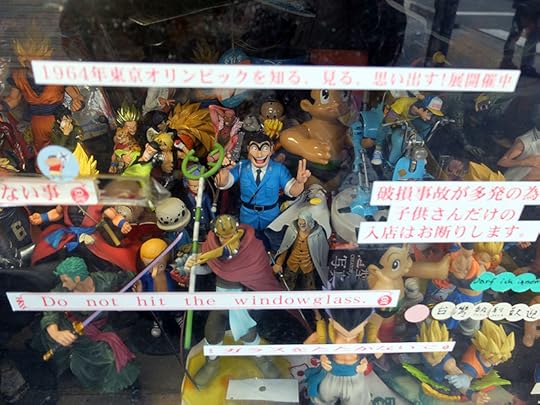
Guess what we found? Suzuki-san! We met the nicest man who owned a great store with everything Mr. H wanted. Man, I did not know so many action figures existed! Well, the scantily-clad women, I knew they existed.

We left with some very special souvenirs, too. See those two signs in the middle picture below? One is of chocolate cigarettes and the other shows a Japanese housewife preparing fast food. We checked both in repurposed cardboard boxes as our luggage allowance because that’s how we roll.

And didn’t we find just the place for both signs? From a corner store in Kyoto to a country kitchen in New England.

I do not think the model for this beautiful woman would really have poured mystery meat out of a package, but I gotta say she looks good on our pantry door.
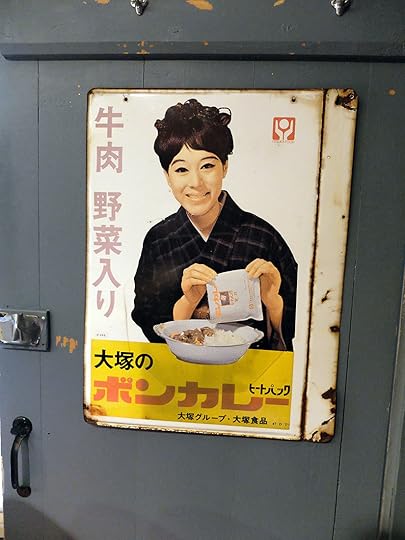
Now I have a reminder of our amazing trip every time I walk into the kitchen. I judge my voyages by my souvenirs, and this trip was a winner.
January 23, 2018
Wile E. Dog, Super Genius

I talked Mr. Hallock into a puppy. He did not stand a chance once he saw this picture. This little pup is about half-ish Border Collie and half-mutt. Many of her littermates (the “Broadway Babies,” with one even called Hamilton!) are still up for adoption, so check out the rescue here. They’ve named this little girl Matilda, but we have a different idea in mind:
Mr. Hallock and I thought that poor Wile E. needed to catch a break, and getting us as dog parents is a pretty big stroke of luck. Our Wile E. (“Wiley”) arrives February 10th from Alabama, and I can hardly wait. Get ready for puppy pictures!


January 18, 2018
Roosters, Egrets, and Manhole Covers, Oh My!
Who says manhole covers cannot be useful and beautiful? The Japanese see the potential. In both Kobe and Himeji, I found myself searching out these beauties like my students search out Pokémon Go. Here’s a few for you:


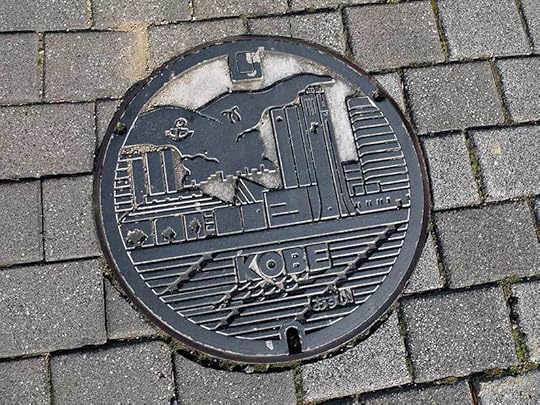

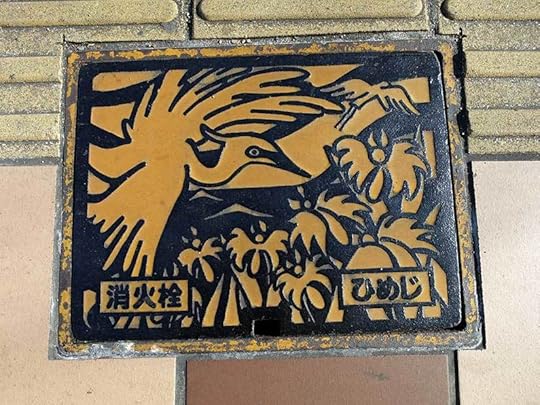
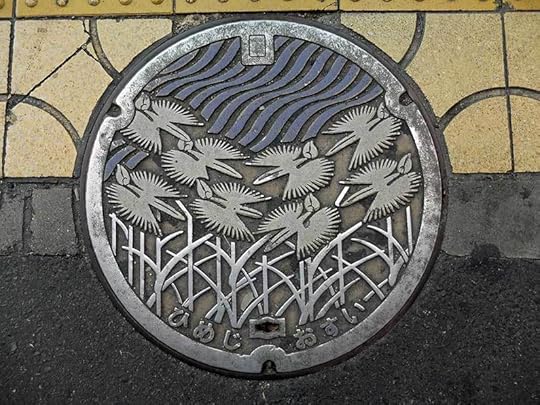
Here’s to municipal beauty!
January 14, 2018
Japan for History Geeks
It has been a while since I’ve taught a world history survey course, but I do remember that one of my favorite lessons was about the Meiji Restoration in Japan.
What was that? Let’s start at the beginning. In medieval times, the emperor of Japan was a prisoner in his own palace in Kyoto. Though he was still considered a god in the Shinto religion, and though he was too holy to touch the ground, his divinity meant nothing politically and economically for 675 years. From 1192 to 1867, the military dictator who collected taxes, made treaties, and governed was called the shogun. And it benefitted the shogun to keep the emperor holed up in his palace. Now, it is a nice palace, as you can see below. Maybe a little cold in winter, but nice. Still, it was still a prison.
 The photo on the left is the throne room of the Imperial Palace in Kyoto. In the shadows, you can still see the thrones, which will be moved to Tokyo soon because the emperor is stepping down in favor of his son. On the right is the emperor’s privacy tent in his living quarters. Does that tatami mat look super thick? Why, yes, because it’s for the emperor!
The photo on the left is the throne room of the Imperial Palace in Kyoto. In the shadows, you can still see the thrones, which will be moved to Tokyo soon because the emperor is stepping down in favor of his son. On the right is the emperor’s privacy tent in his living quarters. Does that tatami mat look super thick? Why, yes, because it’s for the emperor!The shogun was meant to keep peace amongst all the daimyo, or feudal lords, each who had their own stable of knights, or samurai. But battles still happened. Fortified homes were still needed, like the one at Himeji, Japan’s most beautiful surviving castle.

(Note: Though most people focus on just the bombing of Hiroshima and Nagasaki in World War II, the United States Army Air Corps actually destroyed an additional 64 cities in this war, killing 333,000 people and making 15 million homeless. According to the Himeji tour, about 2/3 of the city itself was destroyed, but the single firebomb that landed on the roof of the castle failed to detonate. Luck? Check out the fish below to find out.)
 Inside Himeji Castle’s wooden interior. On the right, see one of the double doors, a key piece of protection for when you are fighting in feudal times. You can open the door to let a few warriors out without getting a whole slew of attackers coming in. Hey, that’s useful. Maybe I’ll install one here in New Hampshire.
Inside Himeji Castle’s wooden interior. On the right, see one of the double doors, a key piece of protection for when you are fighting in feudal times. You can open the door to let a few warriors out without getting a whole slew of attackers coming in. Hey, that’s useful. Maybe I’ll install one here in New Hampshire. At the corner of each portion of the roof, you will see a flying fish (left picture). This one is several hundred years old and has been preserved for visitors to see close up. These were meant to protect the castle from fire. Was that the reason the incendiary bomb did not go off in World War II? Being traditionally-clad courtiers, Stephen and I (on the right) think so.
At the corner of each portion of the roof, you will see a flying fish (left picture). This one is several hundred years old and has been preserved for visitors to see close up. These were meant to protect the castle from fire. Was that the reason the incendiary bomb did not go off in World War II? Being traditionally-clad courtiers, Stephen and I (on the right) think so. A view of the main castle from the expanded quarters of Princess Sen and her family.
A view of the main castle from the expanded quarters of Princess Sen and her family. On the left is a hole in the defensive wall tall enough for archers to maneuver and aim. They can lean left or right to follow their targets. There are also square, triangle, and circle holes that serve the same purpose, but for guns. On the right, the visitor can see roof tiles dedicated to the ruling family. Himeji changed hands several times, and each family added a new symbol to the roof.
On the left is a hole in the defensive wall tall enough for archers to maneuver and aim. They can lean left or right to follow their targets. There are also square, triangle, and circle holes that serve the same purpose, but for guns. On the right, the visitor can see roof tiles dedicated to the ruling family. Himeji changed hands several times, and each family added a new symbol to the roof.The shogun was best when he kept the daimyo from fighting each other, but the farther away he lived, the harder it was for him to keep the peace. Where did he live? It depended upon where the home base of the shogun’s clan and was. For the powerful Tokugawa Shogunate, this meant Edo, or Tokyo. He did have to visit Kyoto on occasion, though, so he needed a private residence here: Nijo Castle.
 The beautiful copper and wood roof of Nijo Castle.
The beautiful copper and wood roof of Nijo Castle.When you visit Nijo Castle, ironically, you can see the end of the shogun’s power. When Commodore Perry of the US Navy forcibly opened Japan to unconstrainted Western trade and exploration, it could have spelled an end to the country’s independence. China was carved into spheres of influence, and some in Japan feared the same for them. The European powers were taking rival sides at court, some backing the emperor and others backing the shogun and daimyo.
Unlike other countries in world history, though, the Japanese realized that a civil war would only benefit foreigners. The emperor (who was only 17), his advisors, and the shogun worked out a compromise, restoring political and military power to the emperor. The edict of the Meiji Restoration (1867) was proclaimed from this very room in Nijo Castle. Today you can see models of the shogun, his bodyguard, and his loyal supporters, all ready to welcome the emperor. Yay, the emperor can leave his house now!

This was the moment that changed everything for Japan. Soon education became universal, Western (“Dutch”) science and technology were accepted, and the military was modernized. Within a few decades, Japan became an imperial power itself. Now, that did not go so well for lots of people, especially after the military rose to power again: the defeat of Russia in 1905 (which led to a revolution there), the colonization of Korea and Taiwan, the invasion of China, the Nanking Massacre, the invasion of Southeast Asia, the Pacific War, and so on. Hence the firebombing mentioned above. But I digress…
The point is that we saw lots of history. It was great.
January 8, 2018
Young Love in Japan
If you believe Mr. Hallock, the Japanese celebrate Christmas like Valentine’s Day. You still have to go to work, but you get to eat chocolate—and celebrate young love! As a romance author, I felt right at home.
 Couples making a wish at Yasaka Koshin-Do in Kyoto, Japan. Sewn pouches called “good faith monkeys” have their hands and feet bound together outside a statue of the guardian warrior, Shomen Kongo. This restraint reflects the binding of a single desire in order to have the guardian grant your other wishes. On Christmas Eve, the temple was full of couples binding their desires together. It may not be your idea of a romantic date, but there are plenty of Japanese who would disagree with you.
Couples making a wish at Yasaka Koshin-Do in Kyoto, Japan. Sewn pouches called “good faith monkeys” have their hands and feet bound together outside a statue of the guardian warrior, Shomen Kongo. This restraint reflects the binding of a single desire in order to have the guardian grant your other wishes. On Christmas Eve, the temple was full of couples binding their desires together. It may not be your idea of a romantic date, but there are plenty of Japanese who would disagree with you. A couple getting a photo in underneath Himeji Castle in the Kokoen Garden.
A couple getting a photo in underneath Himeji Castle in the Kokoen Garden. Carriages take lovers through the Bamboo Forest in Arashiyama on Christmas Day.
Carriages take lovers through the Bamboo Forest in Arashiyama on Christmas Day. On the streets in Gion, tradition mixes with modernity. I did not want to be that person foisting my camera lens in people’s faces, but I could not help it.
On the streets in Gion, tradition mixes with modernity. I did not want to be that person foisting my camera lens in people’s faces, but I could not help it.A few years ago, it was reported that record numbers of Japanese are forgoing marriage for career and lifestyle. They may have chosen “happy for now” over “happily ever after,” but they are still living and loving.
January 4, 2018
Naughty Hello Kitty
It is time for most of us to go back to work after the holiday, so here’s a little fun to start your new year right. As part two of my Hallocks in Japan series, I have a special treat for you: Hello Kitty!
 Samurai Hello Kitty (but cute, of course), and Hello Kitty at Fushimi Inari shrine in Kyoto.
Samurai Hello Kitty (but cute, of course), and Hello Kitty at Fushimi Inari shrine in Kyoto.Hello Kitty is a 1970s Japanese cartoon character that exemplifies kawaii, or cute culture, in Japan. And she is everywhere. I mean everywhere.
Not just on fancy, branded items, either—but there, for sure. As the photos below show, you can find (clockwise from top left) a Hello Kitty purse (which I did not buy), a Hello Kitty chopsticks trainer for children (which we got as a gift because how awesome?), a Hello Kitty Inoda Coffee store mug (normally I buy a Starbucks city mug, but not this time!), and a series of sake glasses (which I very much regret not buying at the Kyoto airport).

But that’s not all, folks. You can have Hello Kitty all throughout your home—even your medicine cabinet. Want Hello Kitty nail clippers? Yep, they’ve got ’em. Hello Kitty cutting board and placemat? Check out the bottom right corner. What about a Hello Kitty air mask to protect you in flu season? (About 10% of people I saw in public transportation wore such masks. Plain white ones, though, not cool Hello Kitty models.) Finally, don’t forget the fresh-butt-feeling you will get from Hello Kitty fruit-scented cleaning wipes. Butterfly approved!

Wait a second, Jen. Butt wipes? Let’s go down this My-Melody-rabbit hole for a moment. One of the most innuendo-laden promotions I saw in Japan was Lawson convenience mart’s soup bowl giveaway. Check it out:

Check out Hello Kitty and My Melody. Do they look a little, um, surprised? Maybe a touch . . . debauched? Compare this look to erotic Japanese manga, if you do not believe me.

What do these not-so-innocent cartoon characters have to do with miso soup bowls (the product being given away)? I have to chalk it up to being one of Japan’s fascinating contrasts: sappy, childish cuteness with an adults-only subliminal message.
Okay, okay, you want more soup, less sex? Then you want to go to the Hello Kitty tea house in the Ninen–zaka and Sannen-zaka preserved districts of Kyoto. There you can get Japanese curry and vegetables, served on rice shaped like Hello Kitty’s head! Or a Hello Kitty pancake. Or a Hello Kitty matcha green tea sundae. If gobbling up your cartoon hero does not sound delicious, then you are not a true fan!

I am being a little unfair since my own favorite, Snoopy, is almost as popular in Japan as Hello Kitty. It also has its own branded store and cafe in Nishiki Market, Kyoto. Only great restraint (and fiscal prudence) kept me from buying up the entire shop. Look at those adorable Charlie Brown mochi!

Soon, I will take a deeper look into Japanese history and show you around a few of my favorite places. And also sewer drains! Don’t forget the sewer drains. See you soon!
January 1, 2018
Will Travel for Food
Mr. Hallock and I went to Japan for the food. I mean, yes, as mentioned before, Mr. H grew up in Kobe, so there was an emotional pull. But it was really all about the food. We eat a lot of Japanese cuisine at home: sushi (when we are feeling flush), miso ramen (the real stuff, not instant!), and tonkatsu (deep-fried pork loin on rice). Our goal for this trip was to expand our culinary horizons and stuff our faces. Mission accomplished.

Saloon. Gastropub. Tavern. Izakaya. This is the stuff! One small problem, though: we don’t speak Japanese. To be fair, Stephen recalled a surprising amount from his childhood, which helped in a pinch, but neither of us could read a menu.

Fortunately, our first real izakaya—Gassai Ekinan (above) in Himeji—had an English menu, allowing us to try some local specialties, like lotus root tempura. Yum! Emboldened, we searched for the best izakaya in Kyoto once we got there. And we saw one that looked amazing, but we could find nothing about it in English, either in front of the shop or on the web. Most places we ate at in Kyoto had at least a small sign that announced if an English menu was available. Not here.
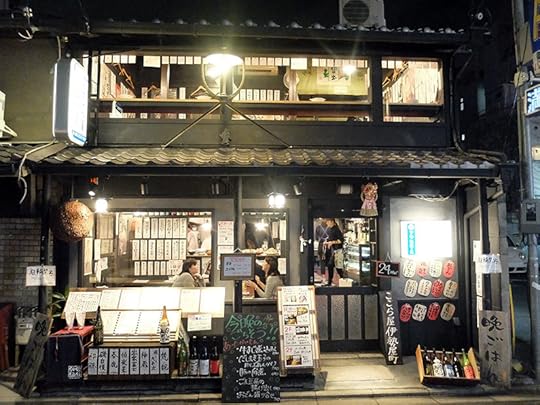
Mr. H and I stared into the window wistfully for a few minutes, but then we chickened out and walked down the road to the Spring Valley Brewery. This was not a bad move, as the brewery had very good craft beer, but we knew we had missed out on something special with the izakaya, so we vowed to go back.
Big problem: we could not find it again. We walked the area around the Nishiki Market a lot, gradually expanding our route in concentric circles, searching for a place that we did not even know the name of. There is a famous documentary on Japanese Zen Buddhism called The Land of the Disappearing Buddha, referring to how the Buddha would give a talk to an audience and then vanish. Hence, we referred to our mysterious izakaya as the “Disappearing Buddha Bar.”
Our very last day in Kyoto, we tried one last time—and Buddha smiled on us! Not only did we find it the next afternoon, but it was empty. Usually, that is not considered a good sign, but we figured that the staff would be more likely to help out clueless foreigners when they weren’t swamped. We stood outside the place again for a minute, our nerve wavering, but then we thought: what the hell, let’s try it! Lo and behold, they did have a (limited) English menu!
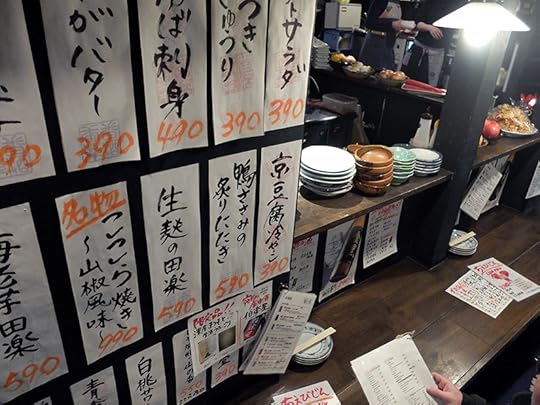
The Disappearing Buddha Bar has a real name: Kokoraya Iseyacho, orここら屋伊勢屋町 in Japanese. The decor inside is full of traditional Japanese handwritten menu pages and vintage Japanese celebrity posters. For all its tradition, though, the music was totally unexpected: American 80s rock-n-roll, including Blondie, John Mellencamp, and more. A sign from the Amitabha Buddha in heaven?

The food was amazing, including the best tempura of the whole trip. We had earlier skipped the touristy place that charged $80 a seat for overrated tempura, so this find felt like cosmic timing. Sweet potato tempura is now one of my favorite foods in the whole world. They also had a “recommended sake” feature (for a set price), and we were totally game—times four! I have a new appreciation for a variety of Japanese rice and vegetable wines. Yum.
We left happy—nay, giddy. Our only regret is that we had to catch a plane too early the next day, and we could not return. Not yet.

If you want to really enjoy eating in a country, you must eat on the street. Or, when in Japan, in the basement of a supermarket. That is where all the food is, even prize fruits:
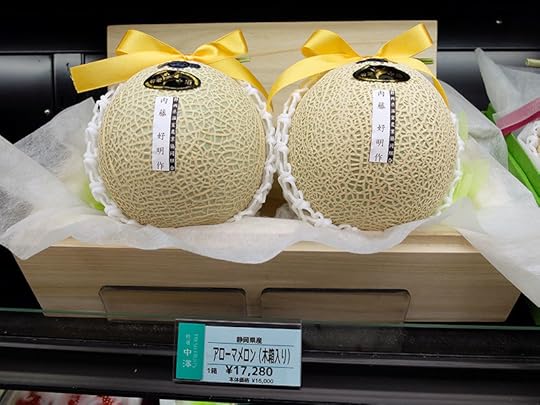 Nice melons. And cheaper than implants (at $150).
Nice melons. And cheaper than implants (at $150).There are also take-home foods, from avocado salad to tofu-wrapped-rice (our favorite breakfast), to fresh-grilled meats, to sushi (yay!). The only drawback is a lack of a place to sit. Had there been open seating, we might have eaten in Daimaru and Sogo the whole trip. The quality of food was amazing.

And then there is old-fashioned fast food, like the seafood munchies available in Nishiki Market. Octopus on a stick? Yep, we’ve got that.
While our focus was mostly on Japanese cuisine, we happened to stay next door to Kobe’s Chinatown our first night, and we craved takeaway Peking duck pockets. Because why not? We also watched talented chefs hand-make soup dumplings, a specialty I remember from lunch with my sister-in-law in Shanghai. A good dumpling should actually burst with soup in every bite. Yum!
Three of our other favorite places in Kyoto were: a spicy ramen shop that we never got the name of but is right across the street from the Hotel Vista Premio where we stayed; an amazing gyoza shop; and Kura kaiten–zushi (conveyor belt sushi) next to the Golden Temple. Nom nom nom . . .

And there were always vending machines for when we could not be bothered to stop for coffee or beer or . . . farm-fresh vegetables? We only saw a veggie machine once, but it seemed like a great idea for food deserts in the United States. I don’t think the alcohol machines would be helpful in the same way, but they were convenient.
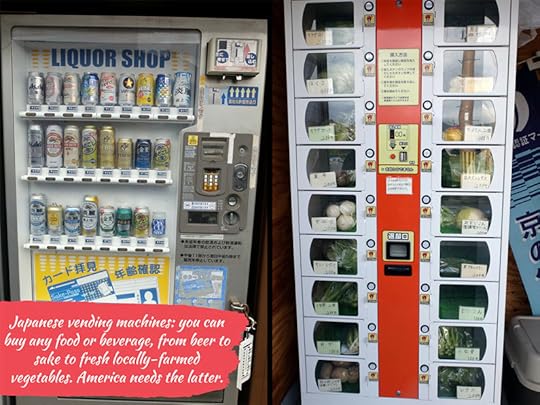
My favorite treat was hot coffee in a can. Japan has been coffee savvy since the post-war period, and Starbucks outlets are about as ubiquitous as Hello Kitty. But who wants to spend $6 on a coffee when, for less than a dollar, you can get a nice, hot coffee (or hot cocoa) at your convenience from a vending machine on every street corner—literally.
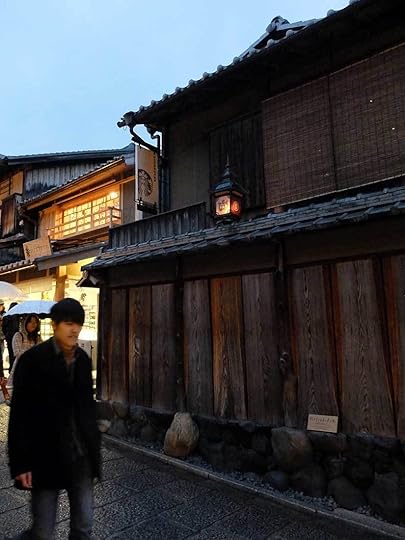 Starbucks is on brand in most of Japan, with big signs in green lettering. But in the Sannen-Zaka preserved district they have to be a little more subtle.
Starbucks is on brand in most of Japan, with big signs in green lettering. But in the Sannen-Zaka preserved district they have to be a little more subtle.It was good that Mr. Hallock and I hoofed it five miles a day, maybe more, throughout each city on our itinerary. Not only did this allow us to discover the best stuff, but it was also necessary to burn off each meal in time for the next one. A perfect vacation.
December 30, 2017
Christmas in Japan with the Hallocks
After the passing of our beloved dogs, Mr. Hallock and I decided that we needed to travel before we adopted any more animals. (Well, just one pooch. That’s our limit. I swear. I’ll let you know.)
Where to go for our first voyage? Japan! (Mr. H spent the very best years of his childhood living in Kobe, so there was a nostalgic element here. I just love the food.)
 Christmas Eve shopping in the Ninen–zaka and Sannen-zaka preserved districts of Kyoto.
Christmas Eve shopping in the Ninen–zaka and Sannen-zaka preserved districts of Kyoto.A Buddhist/Shinto country may seem an odd choice for Christmas, but it was perfect for two Americans seeking an escape from the heavy pressure of the holiday in the States.
 A parade of Japanese Santas on motorbikes was a rare treat in Kyoto.
A parade of Japanese Santas on motorbikes was a rare treat in Kyoto.Not that Christmas is any less commercial in Japan. It may be more so. They have accepted all the fun stuff—Santa, food, and general jolliness—without high gift expectations or family drama. For us, that was a welcome escape.
 On Christmas Day, Santa guided us to the bamboo gardens of Arashiyama on the eastern edge of Kyoto.
On Christmas Day, Santa guided us to the bamboo gardens of Arashiyama on the eastern edge of Kyoto.Mr. Hallock postulates that the Japanese view Christmas sorta like Valentine’s Day: you won’t get the day off work, but you have a good excuse to eat chocolate.
 The tradition in Japan is cake with strawberries. I approve. But a scarce harvest has left the fruit more expensive than ever. I saw a box of 20 gorgeously presented white and red strawberries (two lucky colors) for $100. That’s $5 a berry. These cakes are not cheap, either, at $5 a piece.
The tradition in Japan is cake with strawberries. I approve. But a scarce harvest has left the fruit more expensive than ever. I saw a box of 20 gorgeously presented white and red strawberries (two lucky colors) for $100. That’s $5 a berry. These cakes are not cheap, either, at $5 a piece. Santa’s little helpers selling delicious treats in the mall. These full cakes are about $30-$40 each.
Santa’s little helpers selling delicious treats in the mall. These full cakes are about $30-$40 each. Or how about a little Christmas fritter? This is more my price range.
Or how about a little Christmas fritter? This is more my price range. But, really, what says Christmas more than a $12 apple? It seems they grew the fruit with a sticker over it to discolor the skin. Cool, huh? Not cool enough for $12, but cool.
But, really, what says Christmas more than a $12 apple? It seems they grew the fruit with a sticker over it to discolor the skin. Cool, huh? Not cool enough for $12, but cool. I just had to finish with this one. Mr. H and I have our own tradition born the first year of marriage. We were living in West Beirut—the Muslim half of a multicultural town—and everything was open for the holiday. And Santa there was selling pizza! We weren’t much of cooks then so we bought the pizza, and it was delicious. We have eaten a Christmas pizza every year since, and I guess that we are not the only ones! (We did not eat this piece of pizza, though. Eww.)
I just had to finish with this one. Mr. H and I have our own tradition born the first year of marriage. We were living in West Beirut—the Muslim half of a multicultural town—and everything was open for the holiday. And Santa there was selling pizza! We weren’t much of cooks then so we bought the pizza, and it was delicious. We have eaten a Christmas pizza every year since, and I guess that we are not the only ones! (We did not eat this piece of pizza, though. Eww.)There will be more Japan posts to come. Themes will include Hello Kitty, good food, sewer drains, and much, much more. I don’t know what is better than cool sewer drains, but trust me I’ll find it.
Sugar Sun Series Extras
- Jennifer Hallock's profile
- 38 followers



